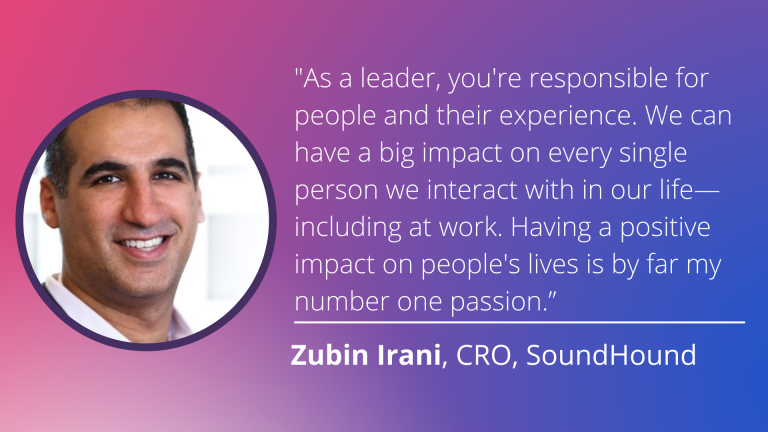
Building an Exceptional Culture with SoundHound’s CRO, Zubin Irani
Meet our Executive team! We’re back with our Executive Interview Series, this time interviewing SoundHound’s Chief Revenue Officer, Zubin Irani.
“There’s no one required path to becoming a conversation designer. Some of the common fields we come from include linguistics, cognitive science, psychology, computer science, and writing.”
Cathy Pearl
Head of Conversation Design Outreach, Google, @cpearl42
“Regardless of major, take practical courses in programming, design, communication, gerontology, and ethics to understand the many aspects of business better.”
Heidi Culbertson
CEO and Co-Founder, Marvee, @hculbertson
“Ongoing curiosity will advance you more than a specific education or degree. Find a great teacher or boss you can learn from. Be discerning and skeptical of everything you read and hear. Think critically. This is how you learn — less so in school.”
Emily Binder
Founder of Beetle Moment Marketing, @emilybinder
“It’s possible to pursue a passion for code after university. I found success in this field by joining Hackbright coding bootcamp and constantly learning through hackathons, online courses, and side projects.”
Olivia Bettaglio
Software Engineer, SoundHound Inc.
“Get the best liberal arts education you can and learn basic programming. The voice-first community will help point you in the right direction along the way.”
Janice K Mandel
VOICE Summit Content Director and Women in Voice Leader, @JaniceKMandel
“Voice AI gives women in tech a great opportunity to develop skills that would make them more valuable. Focus on developing the right skills versus focusing on specific degrees.”
Rashmi Rao
Global Head, Advanced Engineering and UX, HARMAN/SAMSUNG, @rashmitweets
“Avoid focusing on a specific degree. Instead, identify the skills you need to perform a job, seek employers and mentors who can help you to foster those skills, and learn to learn.”
Rachel Liddell
Product Manager, IBM
“When it comes to landing a job, technical skills get you in the door, and soft skills are what make you excel throughout your career.”
Joan Palmiter Bajorek
Founder of Women in Voice, @joanbajorek
“Knowledge, humor, and the ability to move things forward, in whatever chosen realm, is a rare talent. Women bring strength, perspective, and empathy, which is important as AI/tech evolves, and an incredible bonus.”
Heidi Culbertson
Co-Founder of Marvee
“Learn how to learn better. Lessons are everywhere, but comprehension and retention are learned skills. Practice by teaching others what you want to master.”
Emily Binder
Founder of Beetle Moment Marketing
“As a product manager, I rely on close listening, empathy, and communication skills. At its core, the job is to understand customer needs, translate those needs into product strategy, and then communicate that strategy to the development team.”
Rachel Liddell
Product Manager, IBM
“Good coding skills are incredibly useful regardless of how you intend to contribute to a voice AI system.” — ,
Maisy Wieman
Senior Software Engineer, SoundHound Inc.
“The skills it takes to make something talk range from computer science to writing. Of course, nothing ends well without good listening and project management skills.”
Janice K Mandel
VOICE Summit Content Director and Women in Voice Leade
“Given this is a dynamically evolving field, adopting a continuous learning approach and keeping yourself up-to-date on market trends is important. I’m currently pursuing Udacity’s Intro to Self Driving Cars Nanodegree to keep me in touch with ground reality.”
Rashmi Rao
Global Head, Advanced Engineering and UX, HARMAN/SAMSUNG
“For voice AI data engineers, your toolkit should include Python, SQL, big data tech like Spark and Kafka, machine learning techniques, and of course, the art of Stack Overflow searching.”
Olivia Bettaglio
Software Engineer, SoundHound Inc
.
“Don’t sell yourself short. Even the experts are just people who have been doing things longer.” — Cathy Pearl, Head of Conversation Design Outreach, Google
“Find your people. Who’s there for you on dark days? Who can help you hone the professional skills you need? Who do you look up to? Invest in those people and be that person for others.” — Joan Palmiter Bajorek, Founder of Women in Voice
“Learn to own your knowledge, your perspective, and your context…and speak up. AI/tech has bias without all of us.”
Heidi Culbertson
Co-Founder of Marvee
“All points of view need to be represented in voice tech so bring all the educated compassion you can to the table.”
Janice K Mandel
VOICE Summit Content Director and Women in Voice Leader
“If you have an interest in coding, go for it! Start small and see what you can accomplish with only your curiosity.”
Olivia Bettaglio
Software Engineer, SoundHound
“Identify your strengths, and then match those strengths to a role. If you’re quantitative, consider data science or computer science. If you’re great with clients, think about being on the front lines of implementation or working as a sales engineer.”
Rachel Liddell
Product Manager, IBM
“If you’re going into tech as a woman or minority or both, make sure you love it.”
Noelle LaCharite
Director of Developer Evangelism, Microsoft
Subscribe today to stay informed and get regular updates from SoundHound Inc.